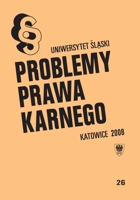Uchylenie zakazu prasowej publikacji danych osobowych i wizerunku a proces karny
The abrogation of the injunction of the press publication of personal data and image vs the penal trial
Author(s): Radosław KoperSubject(s): Law, Constitution, Jurisprudence
Published by: Wydawnictwo Uniwersytetu Śląskiego
Summary/Abstract: The article touches upon the issue of the injunction of the press publication of personal data and image in the context of the exclusion of the obligation of this restriction. Considerations concentrate on the penal-trial level. The establishment of the possibility to abrogate the above-mentioned injunction is connected with a distinction of two general normative bases in this field: 1. Law regulations – press law: a) art. 13 act. 2 – permission of the participant of the penal trial (the accused, victim, witness), b) art. 13 act. 3 – permission of the prosecutor or the court given with respect to the accused; 2. Regulations of other acts: a) art. 279–280 of the penal code – searching for the accused by means of the warrant of arrest, b) art. 39 pkt 8 and art. 50 of the penal code – the execution of the punishment in the form of revealing the sentence to the public, under the conditions of conducting a court proceeding, as a result of the introduction of a special means of prosecution. In the case of the situations in question, what rises doubts and controversies is the evaluation of the legitimacy of the regulation enabling the prosecutor or court to give a permission to a press identification of the accused. This kind of solution should undergo criticism, above all, in view of the restriction of the principle of the presumption of innocence of the accused and his right to privacy. The circumstances that could possibly justify the existence of an important social interest as a condition of the abrogation of the injunction under discussion, are not enough to justify such interference into the sphere of a private life or violate dignity or a good name of the accused, with one exception. That is, the situation differs when the accused holds the status of a public person. The necessity to realize the informative function of the press with respect to the subjects qualified in this way justifies the acceptance of the acceptability to give the permission to the trial processes to reveal the identity of the accused to the public.
Journal: Problemy Prawa Karnego
- Issue Year: 26/2008
- Issue No: 1
- Page Range: 94-110
- Page Count: 17
- Language: Polish

